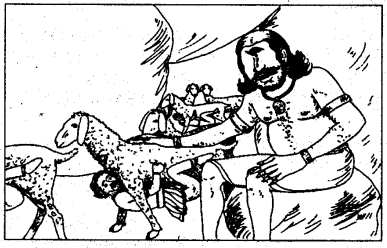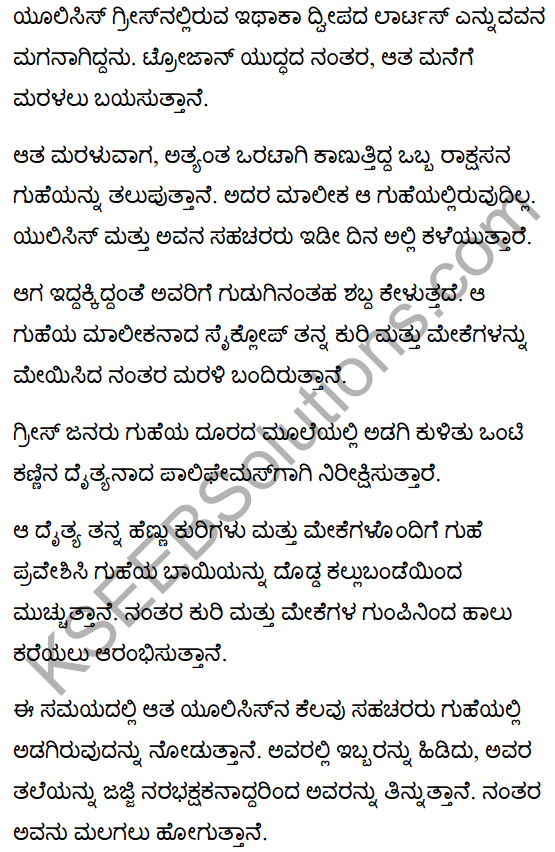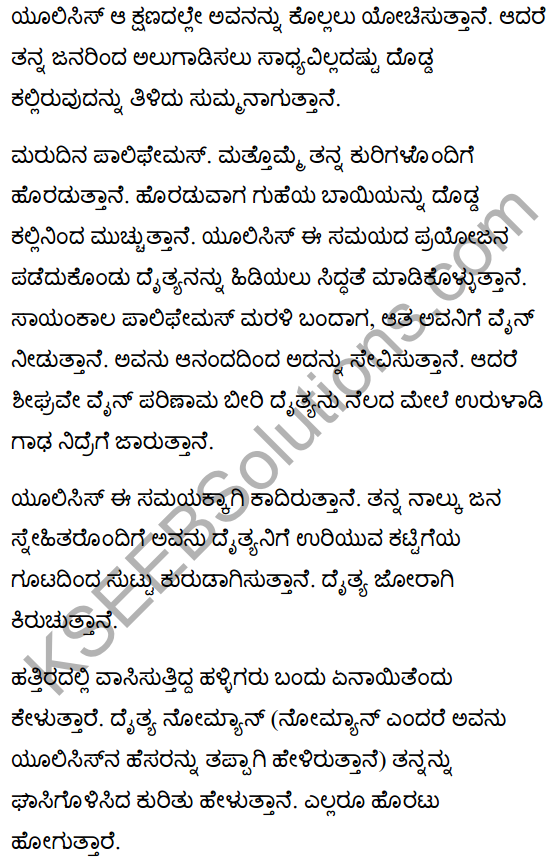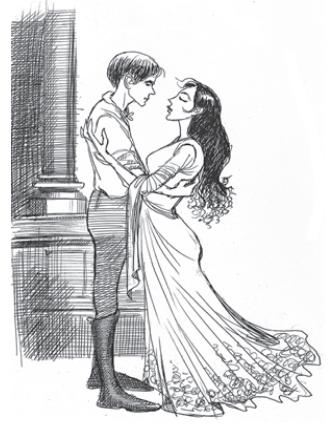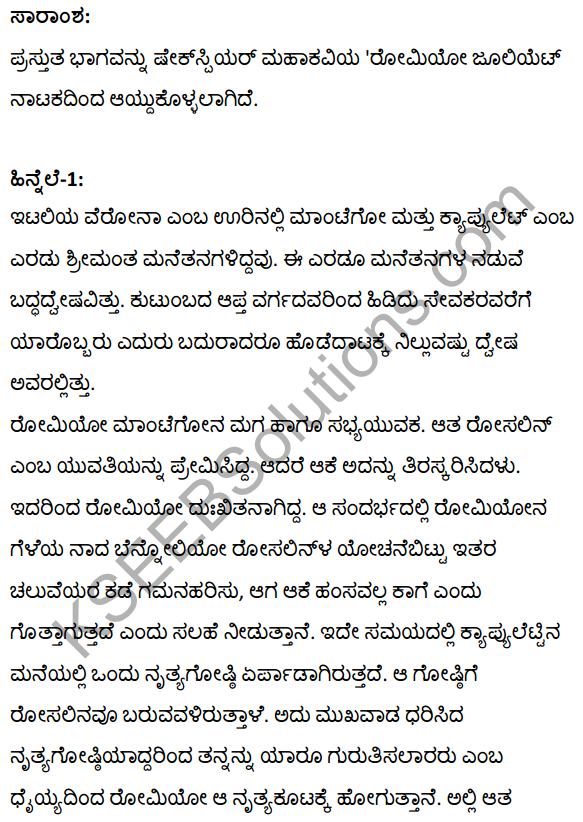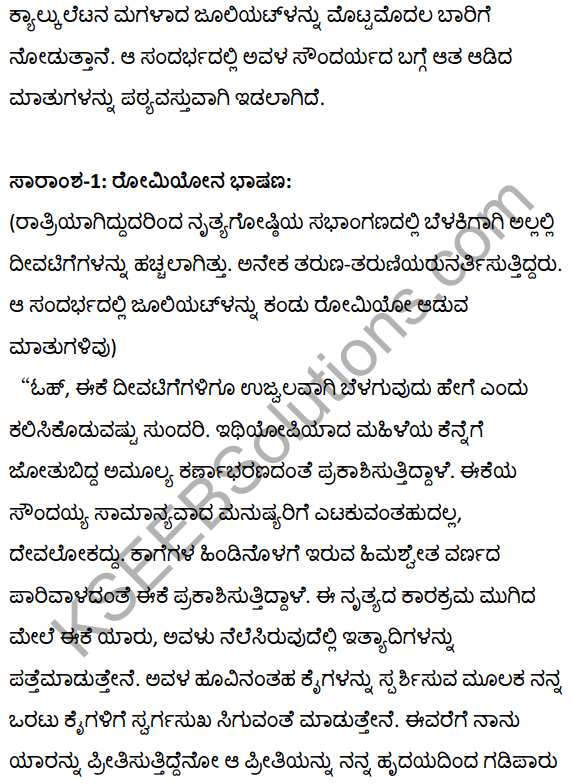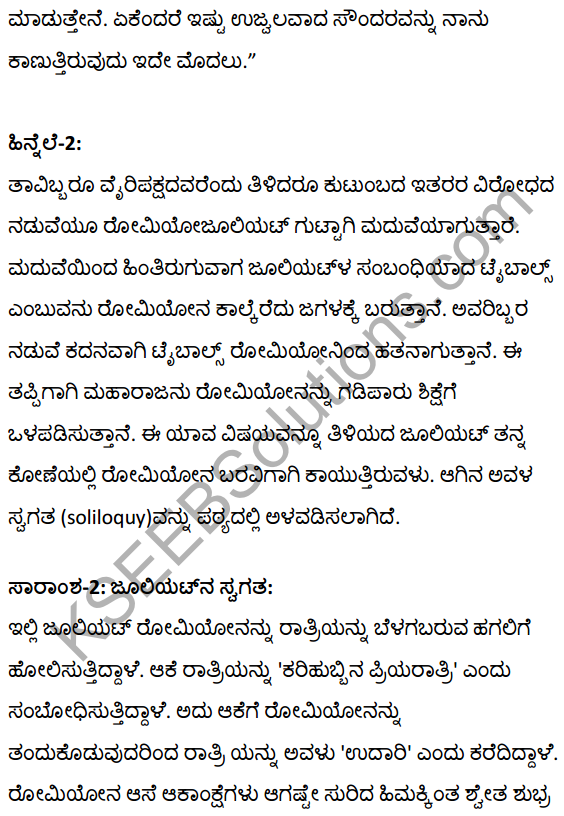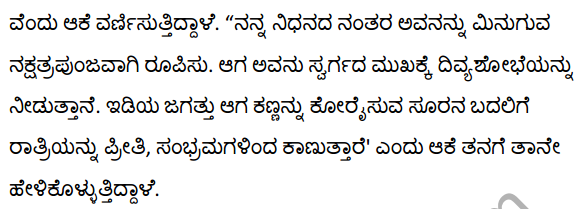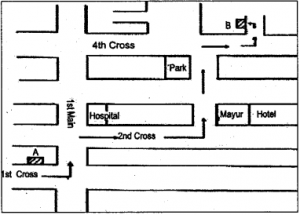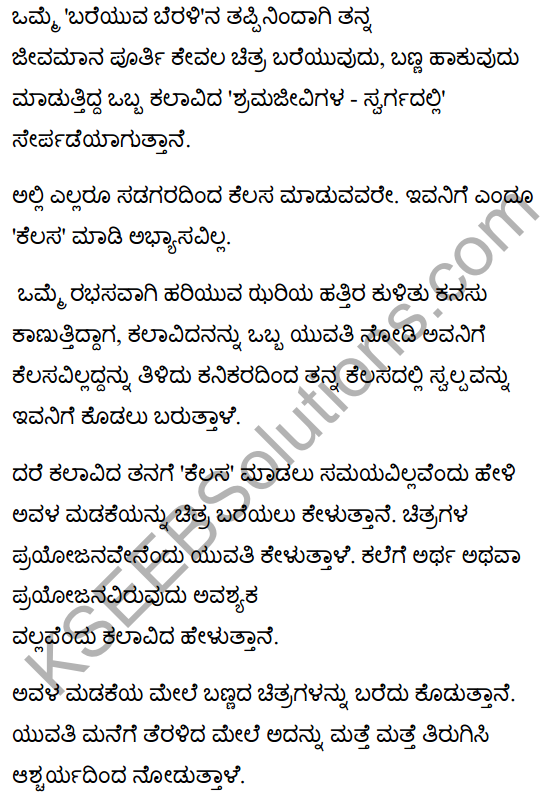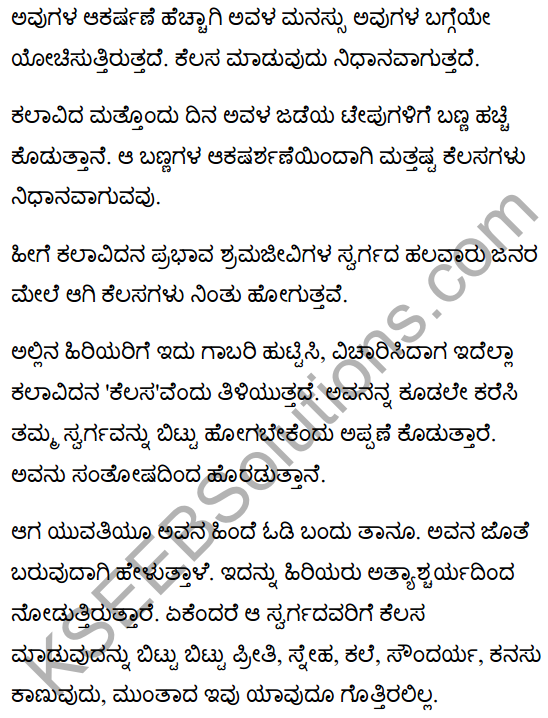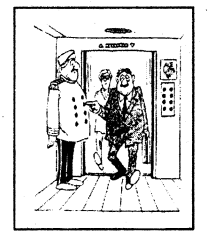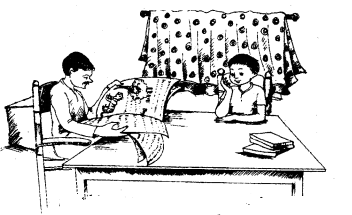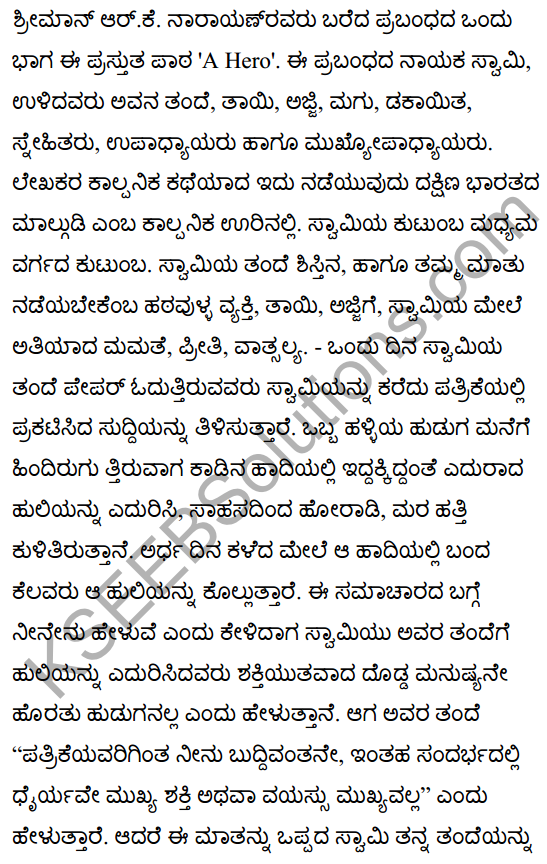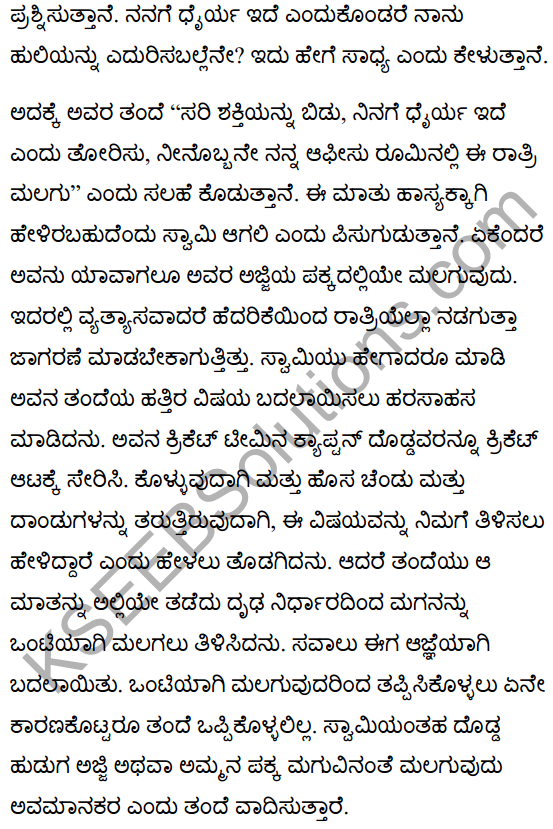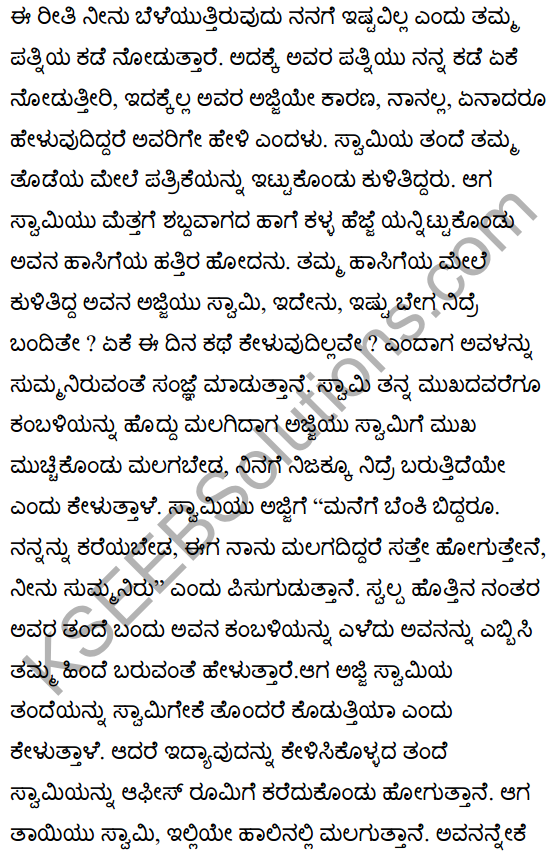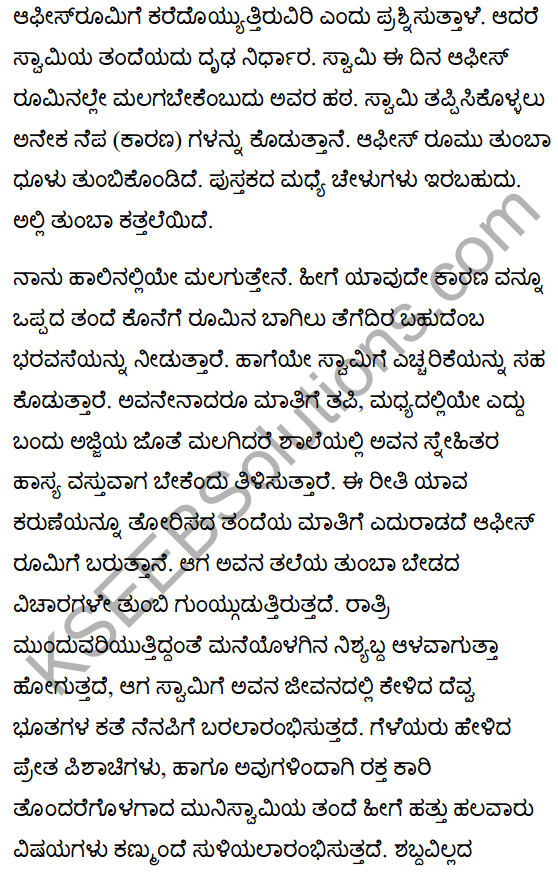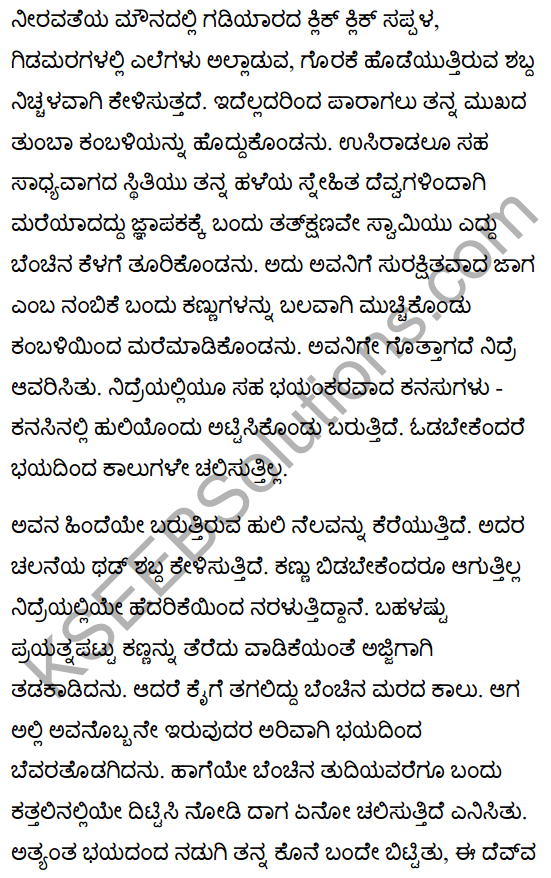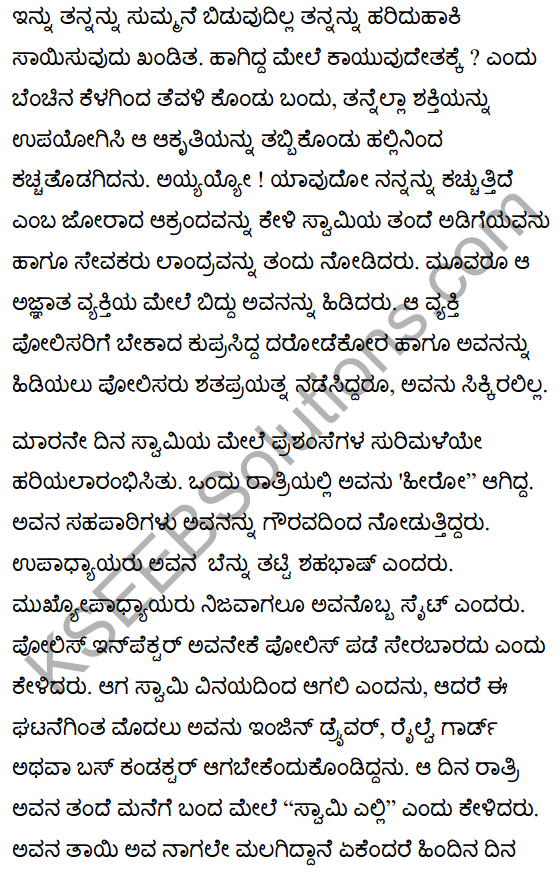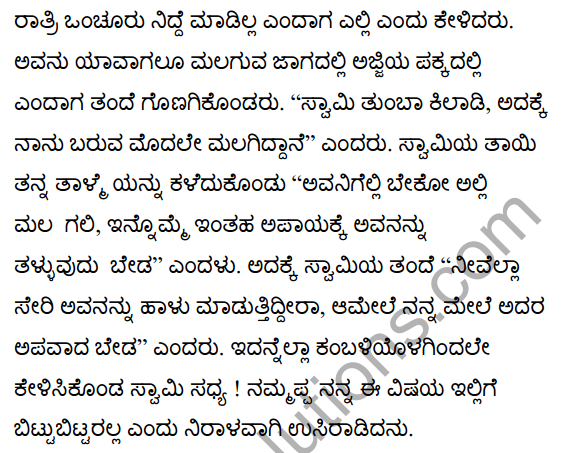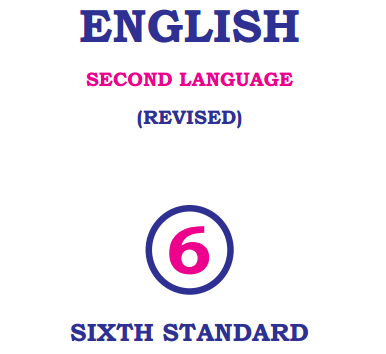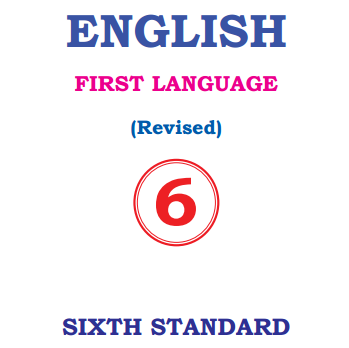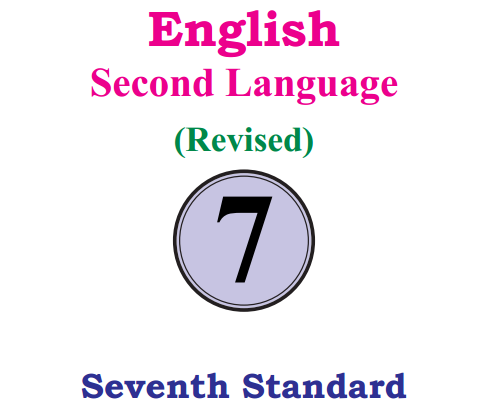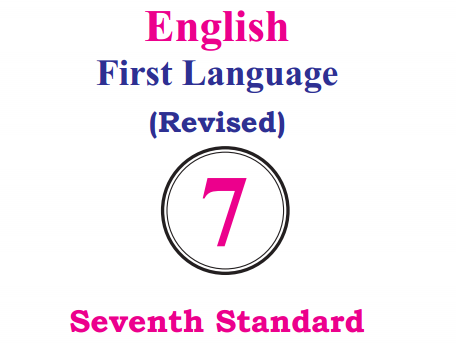Students who are in search of Too Dear! Questions and Answers Pdf, Notes, Summary. First check in which chapter you are lagging and then Download Karnataka Board 2nd PUC English Textbook Answers Chapter Wise. Students can build self confidence by solving the Answers with the help of Karnataka State Board 2nd PUC. English is the scoring subject if you improve your grammar skills. Because most of the students will lose marks by writing grammar mistakes. So, we suggest you to Download Karnataka State Board 2nd PUC English Answers according to the chapters.
Karnataka 2nd PUC English Textbook Answers Springs Chapter 2 Too Dear!
Check out the topics covered in 2nd PUC before you start your preparation. Improve your grammar skills with the help of Karnataka 2nd PUC English pdf links. The Answers for Karnataka 2nd PUC English Textbook Springs Chapter 2 Too Dear! are prepared by the English experts. So, if you follow Karnataka 2nd PUC English Textbook Answers you can cover all the topics in 2nd PUC Chapter 2 Too Dear!. This helps to improve your communication skills.
Too Dear! Questions and Answers, Notes, Summary
Too Dear! Comprehension I
Too Dear Notes 2nd PUC English KSEEB Solutions Question 1.
Why was ‘Monaco’ called a ‘toy kingdom’?
Answer:
Monaco was called a toy kingdom because it had such a tiny landmass that if all the land in the kingdom were divided, there would not be even an acre for each of its seven thousand inhabitants.
Too Dear 2nd PUC English KSEEB Solutions Question 2.
Name the commodities that were taxed in Monaco.
Answer:
The commodities taxed in Monaco were tobacco, wine, and spirit The people also paid a poll tax.
Too Dear Lesson Pdf 2nd PUC English KSEEB Solutions Question 3.
What was the source of the King’s special revenue? Who were its beneficiaries?
OR
Name the special source of revenue in the kingdom of Monaco.
Answer:
The percentage of profit given by the gaming housekeeper to the kinglet was the source of the king’s special revenue. The king, his ministers, courtiers, his servants, a bishop, his generals, and his army were its beneficiaries.
Too Dear Questions And Answers 2nd PUC English Question 4.
Why did the Germans stop gaming houses in their country and how did it benefit Monaco?
Answer:
The Germans stopped gaming houses because those gaming houses did much harm to people. If a man went to a gaming house to try his luck, risking all he had and lost it, then he would even risk money that did not belong to him. If he loses that also, he would be forced to commit suicide by drowning or shooting himself in despair. It benefitted Monaco as it was the only Kingdom that allowed a gaming house to run.
Too Dear 2nd Puc Notes KSEEB Solutions Question 5.
What was the punishment given to the murderer?
Answer:
The murderer was sentenced to death.
2nd Puc English Notes KSEEB Solutions Question 6.
The death sentence was converted into imprisonment for life because
a. Monaco had abolished the death penalty.
b. carrying out the death sentence was expensive.
c. Monaco wanted to show mercy to the criminal.
Answer:
(b) carrying out the death sentence was expensive.
Too Dear Summary 2nd Puc KSEEB Solutions Question 7.
How much did the king spend on the criminal annually?
Answer:
The king spent 600 francs on the criminal annually.
2nd Puc English Notes Too Dear KSEEB Solutions Question 8.
On what condition did the criminal agree to go away from the prison? How was his demand fulfilled?
Answer:
The criminal agreed to go away on condition that he be paid 600 francs as pension for a year regularly until his death. His demand was fulfilled because the prisoner refused to run away from the prison. If he had remained there the king would have been forced to keep a guard over him to watch and also feed him until his death. The criminal left the prison and the king’s dominions as well, as soon as he received one-third of his annuity in advance. He emigrated to another country just across the frontier and settled there comfortably.
Too Dear! Comprehension II
Too Dear Kseeb Solutions KSEEB Solutions Question 1.
Though gambling is a dirty business, why does the king of Monaco resort to it?
Answer:
The king of Monaco resorted to letting the gaming house run in his kingdom because the gaming housekeeper paid a large sum of money out of his profits. This money helped the kinglet to live and enjoy his life, holding court with all the ceremony of a real king.
Too Dear Class 12 Notes KSEEB Solutions Question 2.
Why did the king of Monaco keep changing his mind in dealing with the criminal?
OR
What problems did the authorities of Monaco face in dealing with the criminal? How did they resolve them?
OR
What made the king of Monaco alter his decisions in dealing with the criminal?
Answer:
The king of Monaco kept changing his mind in dealing with the criminal because, every time he took a decision, he faced a problem to execute it. First, the king accepted the judge’s verdict and ordered the execution of the criminal, but he cancelled it and changed the sentence to ‘imprisonment for life’ because there was neither a guillotine machine nor an executioner in his country. Moreover, if he had decided to borrow one from the King of Italy, he would have been forced to levy 2 francs per person as additional tax which he did not like.
Secondly, after keeping the criminal in prison for one year, he realized that he had to spend 600 francs on the maintenance of the criminal until his death, which would have proved to be again a financial burden to his people. Therefore, as advised by his council of ministers, he dismissed the guard hoping that the prisoner would run away. But the prisoner refused to run away because he had nowhere to go and he had stopped the habit of working. Once again the king faced a new problem. Then, as suggested by his council of ministers, the king ordered payment of 600 francs a year as pension and got rid of the criminal.
Too Dear Answers KSEEB Solutions Question 3.
Why was the criminal reluctant to go out of the prison?
Answer:
The prisoner was reluctant to go out of the prison because his character had been ruined by the death sentence given to him and he had nowhere to go. Secondly, by being imprisoned and given food in his cell every day, he had given up working to earn his living. So he had become lazy. Therefore he felt helpless and so refused to go.
2nd Puc English Too Dear Notes KSEEB Solutions Question 4.
How did the criminal lead his life after his release?
Answer:
After his release from prison, the criminal emigrated to another country and settled just across the frontier. With the money he had received as an annuity in advance, he bought a bit of land, started market-gardening and lived comfortably.
Too Dear! Comprehension III
Too Dear Notes 2nd Puc KSEEB Solutions Question 1.
“You can’t earn stone palaces by honest labour.’ Justify with reference to the story.
OR
“You can’t earn stone palaces by honest labour”. How does the author relate this statement to the actions of the king of Monaco?
Answer:
The King of Monaco levied taxes on tobacco, wine, and spirit. He also levied a poll tax. This was the source of his income. But, with the revenue collected this way, the king found it difficult to feed his courtiers, his officials, and to meet his own expenses. Nobody could live a king’s life with the meager income as the Prince of Monaco got from his subjects. Therefore, to drive home the truth of this statement he quotes the proverb, ‘You can’t earn stone palaces by honest labour’. It only means that if one wants to live beyond his means, honest labour alone cannot fetch him enough money for his luxuries.
It implies that one has to take recourse to earn extra money by some dishonest or unethical means. The King of Monaco also had a source of additional or alternative revenue. He used to receive a large sum of money regularly from a gaming housekeeper, who paid it out of his profits earned from his gaming house.
The king knew that earning one’s living by running a gaming house where people risked their money at the roulette table was a dirty business. Yet, he had allowed it to run because he needed more money. Also, he knew that collecting ‘tax’ on tobacco and ‘drink’ was also unethical but, anyhow he had been doing it for a long time and so he did not mind collecting additional revenue by this dirty business as well.
KSEEB Solutions For Class 12 English Question 2.
Though the trial and imprisonment of the criminal is depicted in a comic mode in this story, it does give rise to serious questions. What are they?
Answer:
‘Too Dear!’ tells the story of Monaco, a small kingdom in Europe. The author’s intention is to parody the efforts of the modern state to violently restrain crime.
Monaco had a small population, a small army and was ruled by a kinglet. Since it was a very small kingdom, it had meagre financial resources. The people lived peacefully but somehow a murder was committed. The criminal was tried as per the existing rules of the state and was finally sentenced to death. But, there was neither a guillotine machine nor an executioner in the state.
Therefore the king and the ministers made sincere attempts to borrow them from their neighbours the French Government and the King of Italy. After weighing the pros and cons of incurring a huge expenditure the king gave up the idea of getting the criminal executed and changed it to imprisonment for life. This cost the king 600 francs. When the king reflected over the cost, it struck him that the cost would become a big burden if the criminal lived another fifty years.
Again, the king and his ministers met discussed the issue and dismissed the guard believing that the criminal would run away on his own. But the criminal refused to go. Finally, the criminal was offered a small pension and paid one-third of his annuity as advance. He left the prison and emigrated to another country. Thus, there is a streak of humour in the story throughout
The author’s intention is to prod the reader with the following serious questions:
- Why should ‘violence’ be punished with violence only?
- What is the purpose of trying the criminal in a court of law and decreeing punishment?
- Why are crimes committed and how can they be prevented?
- What is the role of the government in crime prevention?
- What guarantee is there that the ‘truth’ is revealed when the criminal is tried in a court of law?
- How can the miscarriage of justice be prevented?
- How can the court ensure that the convicted criminal is given punishment commensurate with the crime?
- What is the role of the government in ensuring that the family of the criminal is not put to hardship after the execution of a criminal?
- How much time should a country, like Monaco, whose resources are limited, spend on trial and punishment of criminals?
Question 3.
Were there other ways of dealing with the criminal? Discuss in the light of the story.
Answer:
Monaco was a very small kingdom, with a small population and a small army. Also, its revenue was meagre. Yet, the king managed to rule like any other king with courtiers, judges, and ministers enjoying the luxuries and privileges of a king. The king managed to enjoy his kingship, utilizing the additional revenue generated from monopolizing the gambling business. It is highly condemnable that a king should resort to doing a dirty business to enjoy royal comforts. One can only say the king is too self-centered.
As regards the ‘murder’ committed by a criminal, the kingdom did not have either a guillotine machine or an executioner. Secondly, the government could not afford to spend even 12000 francs on borrowing the same from the King of Italy. In such a situation it is quite preposterous to put in place a system of inflicting violence to eliminate violence.
One possible alternative punishment would have been sending the criminal into exile. Another alternative punishment would have been to condemn such criminals to hard, physical labour for life or for a limited period until they reformed their behaviour. It would be far more practical, economical, and humane to use the state’s resources to reduce crimes, this way.
Too Dear! Additional Questions and Answers
I. Answer the following questions in a word, a phrase, or a sentence each:
Question 1.
Where is the kingdom of Monaco situated?
Answer:
Near the borders of France and Italy.
Question 2.
How many inhabitants are there in the kingdom of Monaco?
OR
What is the population of the kingdom of Monaco?
Answer:
About seven thousand.
Question 3.
If the kingdom of Monaco were divided among its inhabitants, how much land would each inhabitant get?
Answer:
Each inhabitant would get less than an acre.
Question 4.
How many men are there in the army of Monaco?
OR
How many soldiers were there in the kingdom of Monaco in ‘Too Dear!’?
Answer:
There are only sixty men in the army of Monaco.
Question 5.
What are the items on which tax is levied in Monaco?
Answer:
The items on which tax is levied are tobacco, wine, and spirits. The people of Monaco also pay poll-tax.
Question 6.
Name the special source of revenue in the kingdom of Monaco.
OR
Where does the special income mentioned in Too Dear!’ come from?
Answer:
The large sum of money paid by the gaming housekeeper, out of his profits from the gaming house.
Question 7.
How did the king of Monaco supplement the kingdom’s revenue?
Answer:
By keeping to himself the monopoly of the gaming business.
Question 8.
Where was the only gambling establishment left in Europe located?
OR
Which was the only place of gambling in Europe as mentioned in ‘Too Dear!’?
Answer:
Monaco.
Question 9.
What business does the Prince of Monaco monopolise?
Answer:
The Prince of Monaco monopolized the business of gaming at the roulette table.
Question 10.
What unusual crime was committed in the kingdom of Monaco?
Answer:
Once, a murder was committed in the Prince’s domains.
Question 11.
What was the hitch in the execution of the criminal?
OR
Why couldn’t the murderer be executed?
OR
Mention one of the reasons for altering the death sentence to life imprisonment in ‘Too Dear!’.
Answer:
The Kingdom of Monaco did not have either a guillotine machine ora professional executioner.
Question 12.
To whom did the ministers of Monaco write first to help them with the execution?
Answer:
The ministers of Monaco wrote a letter of inquiry to the French Government to lend them a guillotine machine and the services of an expert and also inform them of the cost of doing so.
Question 13.
How much did the French government expect for a guillotine machine and an expert?
OR
How much would a guillotine and an executioner cost if supplied from France?
Answer:
The French Government offered to lend a guillotine machine and an expert for a price of 16000 francs.
Question 14.
Who, according to the Council, was a brother Monarch?
Answer:
The King of Italy.
Question 15.
How much did the Italian government demand to supply a guillotine and an executioner?
Answer:
12000 francs.
Question 16.
What reason did the soldiers give for not accepting to execute the criminal?
OR
Why couldn’t the soldiers undertake the job of killing the criminal?
Answer:
The soldiers said that they did not know how to do it and that was one thing that they had not been taught.
Question 17.
Where was the criminal’s food fetched from in ‘Too Dear!’?
Answer:
From the palace kitchen.
Question 18.
Who brought food from the palace kitchen for the prisoner?
OR
Who fetched the criminal’s food initially in ‘Too Dear!’?
Answer:
The guard who was appointed to keep watch over the prisoner brought food for him from the palace kitchen. ,
Question 19.
What was the new item of expenditure noticed by the Prince?
Answer:
The new item of expenditure was the money spent on keeping a guard to watch the criminal and to feed the criminal.
Question 20.
What was the pension offered to the criminal?
Answer:
The king offered a pension of 600 francs to the criminal.
Question 21.
How much did the criminal receive as an advance of his annuity before leaving Monaco?
Answer:
One-third of his annuity.
Question 22.
What work did the prisoner do after being released from prison?
OR
How did the criminal start a new life after he emigrated from Monaco?
OR
What did the criminal do to earn his living after his release?
Answer:
The prisoner bought a bit of land and started market-gardening.
Question 23.
What business does the King of Monaco monopolise?
Answer:
The King of Monaco monopolizes the business of gambling.
Question 24.
What was the initial punishment given to the criminal by the council?
Answer:
The council suggested that the criminal’s head be cut off as directed by law.
Question 25.
“In war, they don’t mind killing people”. Here, the word ‘they’ refers to
a) Council
b) Soldiers
c) Commission.
Answer:
(b) soldiers
Question 26.
Where did the criminal go to fetch his dinner in ‘Too Dear!’?
Answer:
The Prince’s kitchen/ the palace kitchen.
Question 27.
The King’s special revenue in ‘Too Dear!’ came from
a) gaming house
b) poll tax
c) tax on tobacco.
Answer:
(a) gaming house.
Question 28.
The people of Monaco mentioned in ‘Too Dear!’ were
a) sociable
b) peaceable
c) fashionable.
Answer:
(b) peaceable.
Question 29.
Name the ‘Toy Kingdom’ mentioned in ‘Too Dear!’.
Answer:
Monaco is the ‘Toy Kingdom’ mentioned in ‘Too Dear!’.
Question 30.
Who is referred to as ‘a rascal’ by the king in ‘Too Dear!’?
Answer:
The criminal who committed a murder in Monaco is referred to as ‘a rascal’ by the king in ‘Too Dear!’.
Question 31.
Where did the criminal settle after emigrating in ‘Too Dear!’?
Answer:
After emigrating, the criminal settled in a place just across the frontiers, which could be reached by rail in only a quarter of an hour.
Question 32.
Which government is Republican and has no proper respect for the King in ‘Too Dear!’?
Answer:
In ‘Too Dear!’, the French government is Republican and has no respect for the King.
Question 33.
How long was the criminal in the prison in ‘Too Dear!’?
Answer:
The criminal remained in the prison watched by a guard for one year. Then, the guard was dismissed so as to prompt him to run away. But he remained there on his own, unguarded until he was promised a pension.
Question 34.
What does the keeper of the gaming house pay the Prince in ‘Too Dear!’?
Answer:
The keeper of the gaming house pays a large sum to the prince, out of his profits from the gaming house.
Question 35.
Who gains more from the gaming house in ‘Too Dear!’?
Answer:
In ‘Too Dear!’, the prince gains more from the gaming house.
Question 36.
What was unusual about the murder committed in Monaco in ‘Too Dear!’?
Answer:
It was unusual for a murder to be committed in Monaco because the people were peaceable and never had such a crime like ‘murder’ happened before.
Question 37.
The king had to find a special source of revenue because
a) the income from the taxes was insufficient
b) his people drank and smoked less.
c) the people of Monaco gambled a lot
Answer:
(a) the income from the taxes was insufficient.
Question 38.
The death sentence in ‘Too Dear!’ was altered because
a) the king wanted to show mercy to the criminal.
b) doing so would not be expensive.
c) no one was willing to execute the criminal.
Answer:
(b) doing so would not be expensive.
Question 39.
When the guard was dismissed, the criminal in ‘Too Dear!’
a) was happy and tried to run away.
b) worried about the guard’s family
c) did not show any sign of running away.
Answer:
(c) did not show any sign of running away.
Question 40.
The criminal in ‘Too Dear!’ agreed to go away from the prison after
a) he was offered a pension.
b) he was allowed to emigrate.
c) the guard was dismissed.
Answer:
(a) he was offered a pension.
Question 41.
Which kingdom in ‘Too Dear!’ monopolised the gaming business?
Answer:
In ‘Too Dear!’, a tiny little kingdom called Monaco monopolised the gaming business.
II. Answer the following questions in a paragraph of80-100 words each:
Question 1.
Why was the murderer finally sentenced to imprisonment for life?
OR
Why was the death sentence of the murderer altered to imprisonment for life?
Answer:
The king of Monaco sent two letters of inquiry to France and Italy so as to borrow a guillotine machine and the services of an executioner to execute the criminal. The French Government wrote to Monaco that it would cost them 16000 francs. The King of Italy offered to do the work for 12000 francs which included the travelling expenses also.
If the king had accepted the offer, he would have been forced to levy 2 francs per head on the whole population to collect 12000 francs. The people would not have accepted such a financial burden and that would have caused a riot. When the General of the Army also pleaded his inability to get the criminal executed by the soldiers, the ministers met again. They assembled a Commission, and a committee and a sub-committee to explore other ways of punishing the criminal at a cheaper price. They all came to the conclusion that altering the death sentence to one of imprisonment for life was the best thing to do. They also felt that such a step would enable the prince to show his mercy. The king too felt that it was not worth spending so much money to execute a criminal. Therefore, the king changed the death sentence to one of imprisonment for life.
Question 2.
Why did the criminal refuse to run away/escape from the prison?
OR
What were the arguments put forth by the prisoner for not running away from the prison?
OR
Why did the criminal refuse to escape from the prison in ‘Too Dear!’?
Answer:
When the king realized that it was a serious matter to keep a criminal imprisoned for life and it would cause his people a huge financial burden, he summoned his ministers and asked them to find a cheaper way of punishing the criminal. The ministers met and after several deliberations suggested that they must dismiss the guard and 6ave some money. The king agreed to their suggestion. Soon, the guard was dismissed and they waited curiously to see what the criminal would do. The criminal came out of his prison at dinner time, collected his food from the palace kitchen, and returned to the prison, shut the door on himself, and stayed inside.
Later, the Minister of Justice asked him why he had not run away, as there was no guard to watch over him. They even told him that the prince would not mind if he ran away. But the prisoner told them that he had nowhere to go as his character had been ruined and people would turn their backs on him. Moreover, he had forgotten the habit of working and so if he ran away he would be forced to work for earning his living. That is why the criminal refused to run away from prison.
Question 3.
Why did the Council decide to offer the criminal a pension?
OR
Why was the criminal finally offered a pension? How did this offer benefit him?
Answer:
The Minister of Justice asked the prisoner why he did not run away as there was no guard to watch over him. He also told him that the king would not mind if he escaped. But the prisoner told him that he had nowhere to go as his character had been ruined and the people would turn their backs on him. Furthermore, as he had been given food in the prison itself and by doing so he had been prevented from doing any work to earn his living, he had become lazy. Therefore, he refused to go away. He was also feeling bad that he had been treated badly. The ministers met once more and discussed the matter seriously. It struck them that the only way to get rid of him was to offer him a pension.
Not only would the criminal get some money to feed himself as long as he was alive, but there would not also be any need to worry about him anymore. That is why the council decided to offer the criminal a pension. The criminal received one-third of his annuity in advance and emigrated to another country just across the frontier. There he bought a bit of land and started market-gardening. He visited the gaming tables and staked two or three francs, sometimes winning and sometimes losing. He lived comfortably and peaceably like the others.
Question 4.
Why did the authorities in Monaco fail to carry out the death sentence?
Answer:
The authorities in Monaco failed to carry out the death sentence because there was neither a guillotine for cutting heads off nor an executioner. Though they tried to borrow a machine and an expert from their neighbouring countries France and Italy, they realized that it would cost the kingdom a huge sum of money and the king would be forced to collect nearly two francs more per head on the taxes. Even if they were to get the machine, none of the soldiers in the army was ready to cut off the criminal’s head because they had not been taught how to behead a criminal. Therefore, the authorities gave up the idea of carrying out the death sentence.
Question 5.
How does the narrator describe the toy kingdom’?
OR
Describe the kingdom of Monaco with reference to ‘Too Dear!’.
Answer:
The tiny little kingdom called Monaco lies near the borders of France and Italy. There are only about seven thousand inhabitants in it The kingdom is so small that if all the land in the kingdom were divided among its inhabitants, there would not be even an acre of land for each inhabitant. But this toy kingdom has a real kinglet and like any other real king, the kinglet lives in a palace with courtiers, ministers, a bishop, generals, and a small army of only sixty men in all. The king lives by collecting taxes from the people, on tobacco, wine, and spirits and a poll tax. Besides, the king also received a large sum of money from a gaming housekeeper.
Question 6.
Why was the criminal offered a pension finally? How did this offer benefit him?
OR
The criminal led a comfortable life after his release. Explain.
OR
How did the criminal benefit from the pension he was offered?
Answer:
The king’s authorities could not get the criminal executed as per the king’s orders because there was neither a guillotine for cutting heads off nor an executioner in their kingdom. Then, they tried hiring a guillotine and an executioner from their neighbouring countries. When they realized that it would cost them a large sum of money which had to be recovered from the people through additional taxation, they decided to ask a soldier to cut off the criminal’s head. But, when they failed to find a soldier who would be ready to cut off the criminal’s head, they altered the death sentence to one of imprisonment for life.
However, when they found that the cost of maintaining a prisoner in prison with a guard on duty cost the king dearly, they dismissed the guard and asked the criminal to run away. But, when the criminal told them that he had nowhere to go and no work to do, they offered him a pension of 600 francs and sent him away. The criminal received one-third of his annuity in advance and emigrated to another country just across the frontier. There he bought a bit of land and started market-gardening. He visited the gaming tables and staked two or three francs, sometimes winning and sometimes losing. He lived comfortably and peaceably like the others.
Question 7.
Describe the efforts of the ministers in carrying out the death sentence in ‘Too Dear!’.
Answer:
Soon after receiving the judgment given by the court, the prince read out the sentence, confirmed it, and ordered the execution of the criminal. However, there was a problem in executing the king’s orders. Monaco did not have either a guillotine or an executioner. The ministers discussed the matter and sent a letter of inquiry to the French Government asking whether they could lend them a machine and an expert to execute the criminal and also inform the cost involved. The French Government informed them that it would lend them a machine and an expert as well and it would cost 16000 francs.
When the ministers informed the king about it, he thought over it and felt that it would be too burdensome for his people to bear. Then a similar inquiry was sent to the King of Italy. The Italian government offered to lend a machine and an expert at a cost of 12000 francs which included travelling expenses also. Though the price quoted by the Italian government was lesser than that of the French government, the king felt that the price was too much for a toy kingdom like theirs.
Therefore, the council met discussed the issue and asked the General of the Army whether a soldier in the Army would be ready to cut off the man’s head in a rough and homely fashion. When the General discussed this issue with his soldiers, no soldier agreed to do it because they had not been taught how to behead a criminal.
Question 8.
How did the criminal spend his life after he was given a pension in ‘Too Dear!’?
Answer:
When the criminal told the ministers that he had nowhere to go and no work to do, they offered him a pension of 600 francs and sent him away. The criminal received one-third of his annuity in advance and emigrated to another country just across the frontier. There he bought a bit of land and started market-gardening. He visited the gaming tables and staked two or three francs, sometimes winning and sometimes losing. He lived comfortably and peaceably like the others.
Question 9.
Where was the criminal in ‘Too Dear!’ kept and what were the arrangements made for him?
Answer:
In ‘Too Dear!’, as soon as the prince had agreed to alter the death sentence to one of imprisonment for life, the ministers began making arrangements for imprisoning the criminal. But, they did not find a prison suitable for a criminal sentenced to life imprisonment. Finally, they managed to find a place strong enough to keep the criminal in it. They put the young criminal there and placed a guard over him. They asked the guard to watch over the criminal and also to fetch his food from the palace kitchen.
Question 10.
Why were a series of meetings held in Monaco in ‘Too Dear!’?
Answer:
In Monaco, a series of meetings were held to figure out the most prudent or the least expensive way of executing the criminal. As there was no guillotine or an executioner in Monaco, the council of ministers discussed the issue and decided to request the French government to lend them a machine and an expert to execute the criminal. The next meeting was held between the king and the council of ministers to inform the king that the French government had asked 16000 francs as a rental for the machine and the expert and to seek the king’s consent When the king asked them whether the job could not be done at a lesser price, the ministers held another meeting and decided to send a similar inquiry to the king of Italy.
When they learnt that the Italian government wanted 12000 francs for the job, they held another meeting to explore other ways of doing the job with less expense. Later, they consulted the Army General and requested him to find a soldier who would do the execution. When they came to know that none of the soldiers would do it, the authorities assembled a commission, a committee, and a sub-committee and finally came to the conclusion that the best way would be to alter the death sentence to one of imprisonment for life.
Question 11.
How does the kinglet in ‘Too Dear!’ feed his courtiers and officials and keep himself?
Answer:
Though it was a tiny little kingdom, Monaco had seven thousand inhabitants. Its kinglet lived like a real king in a palace with courtiers, ministers, a bishop, generals, and an army of sixty men. The king managed his kingdom by collecting taxes from the people on tobacco, wine, and spirits, and a poll tax. As the revenue so collected was inadequate, he permitted a gaming house to function in his kingdom. Its keeper paid a large sum to the kinglet. Since it was the only gaming house in the continent, it fetched the King of Monaco enough revenue to manage his kingdom. Thus he was able to feed himself and his people with this revenue.
III. Answer the following questions in about 200 words each:
Question 1.
Describe the various ways in which the Prince of Monaco tried to get the criminal executed.
OR
Describe the attempts made by the ministers in solving the problem of cutting off the criminal’s head.
Answer:
Soon after receiving the judgment given by the court, the prince read out the sentence, confirmed it, and ordered the execution of the criminal. However, there was a problem in executing the king’s orders. Monaco did not have either a guillotine or an executioner. The ministers discussed the matter and sent a letter of inquiry to the French Government asking whether they could lend them a machine and an expert to execute the criminal and also inform the cost involved in it. The French Government informed them that it would lend them a machine and an expert as well and it would cost 16000 francs.
When the ministers informed the king about it, he thought over it and felt that it would be too burdensome for his people to bear. Then a similar inquiry was sent to the King of Italy. The Italian government offered to lend a machine and an expert at a cost of 12000 francs which included travelling expenses also. Though the price quoted by the Italian government was lesser than that of the French government, the king felt that the price was too much for a toy kingdom like theirs.
Therefore, the council met discussed the issue and asked the General of the Army whether a soldier in the Army would be ready to cut off the man’s head in a rough and homely fashion. When the General discussed this issue with his soldiers, no soldier agreed to do it because they had not been taught how to behead a criminal.
Question 2.
Explain how and why the Council got rid of the prisoner.
OR
In spite of all their efforts, the king and his team failed in punishing the criminal. How is it narrated in the story Too Dear!’?
Answer:
Soon after the king had ordered imprisonment for life as the punishment, the ministers with great difficulty managed to find a place to keep the criminal imprisoned. They put him in it and placed a guard to watch over him. This way the criminal spent one year in prison. This arrangement cost the king 600 francs a year. When the king thought over it, it struck him that the criminal was young and may live for another fifty years.
The king became apprehensive about the cost of keeping the criminal imprisoned for life. Therefore, he summoned his ministers and asked them to find a cheaper way of punishing the criminal. The ministers met and discussed the issue and came to the conclusion that the only way to save money was to dismiss the guard. They believed that the criminal would run away and their problem would be solved. The king agreed to their suggestion and the guard was dismissed accordingly.
However, they waited curiously to see what the criminal would do. The criminal came out of his prison at dinner time, collected his food from the palace kitchen, and returned to the prison, shut the door on himself, and stayed inside. Later, the Minister of Justice asked him why he had not run away, as there was no guard to watch over him. They even assured him that the prince would not mind his running away. But the prisoner told them that he had nowhere to go as his character had been ruined and people would turn their backs on him.
Moreover, he had forgotten the habit of working and so if he ran away he would be forced to work to earn his living. The ministers met once more and discussed the matter seriously. It struck them that the only way to get rid of him was to offer him a pension. The king gave his consent and they finally got rid of him by offering a pension of 600 francs a year. The prisoner received one-third of his annuity in advance and left the king’s dominions. Thus, in spite of all their efforts, the king and his team failed in punishing the criminal.
Question 3.
The king of Monaco is a man without a decisive stand. Do you agree with this? Substantiate your answer with reference to ‘Too Dear!’.
Answer:
No, I do not agree with the statement, “The King of Monaco is a man without a decisive stand” because there is enough evidence to prove that he had to act according to the needs of the situation.
The King of Monaco kept changing his mind in dealing with the criminal because, every time he took a decision, he faced a problem to execute it. First, the king accepted the judge’s verdict and ordered the execution of the criminal, but he cancelled it and changed the sentence to ‘imprisonment for life’ because there was neither a guillotine machine nor an executioner in his country.
Moreover, if he had decided to borrow one from the King of Italy, he would have been forced to levy 2 francs per person as additional tax which he did not like. Secondly, after keeping the criminal in prison for one year, he realized that he had to spend 600 francs on the maintenance of the criminal until his death, which would have proved to be again a financial burden to his people.
Therefore, as advised by his council of ministers, he dismissed the guard hoping that the prisoner would run away. But the prisoner refused to run away because he had nowhere to go and he had got out of the habit of working. Once again the king faced a new problem. Then, as suggested by his council of ministers, the king ordered payment of 600 francs a year as pension and got rid of the criminal.
Question 4.
‘Too Dear!’ ridicules the foolishness of rulers. Discuss.
Answer:
The story ‘Too Dear!’ exposes the predicament of a ruler who is forced to revise his own judgment not out of mercy but out of financial compulsions. The narrator seems to ridicule the foolishness of rulers who make rules unmindful of the real situation in which they are placed.
The story is thus a parody of one of the modern systems of governance. It ridicules the ways of bringing criminals to book and dispensing justice in modern states. Though the story is narrated in a matter of fact tone, there is an undercurrent of sarcasm.
Monaco is a tiny kingdom with only seven thousand inhabitants. It has a real kinglet who lives in a palace with courtiers, ministers, a bishop, generals, and an army of only sixty men in all. The king lives by collecting taxes on tobacco, wine and spirits, and a poll tax. As the revenue collected from the people is too meagre to feed himself and his people, the king permits a gaming house where people play roulette. From the profits of the gaming house, the king gets a large sum of money.
This is the situation in which the king is placed. From this one can infer that, based on the size of the population and the army, the king can only be a toy king or a dummy who in reality cannot control the behaviour of the people except through mutual understanding and ethical principles.
The system of governance is only a make-believe system and it can boomerang or collapse at any point in time. As long as life goes on smoothly, there is no need for the king to prove to the people that he is their ruler and they must obey him. But, it so happens that a crime is committed, and the king being the moral authority has to exercise his authority. Herein lies the crux of the whole story.
The king behaves like a king of a big kingdom in terms of both money and muscle power and announces a death sentence, which cannot be implemented and, instead of punishing the criminal, gives him a pension. This ironic situation is created because of the foolishness of the king. The king ought to have arrived at his final decision about the criminal only after examining the ground reality.
Question 5.
‘It is a good thing that the criminal committed his crime in Monaco’. Why does the narrator in ‘Too Dear!’ feel so? Explain.
Answer:
The story ‘Too Dear!’ exposes the predicament of a ruler who is forced to revise his own judgment not out of mercy but out of financial compulsions. The narrator seems to ridicule the foolishness of rulers who make rules unmindful of the real situation in which they are placed.
Monaco is a tiny kingdom with only seven thousand inhabitants. It has a real kinglet who lives in a palace with courtiers, ministers, a bishop, generals and an army of only sixty men. The king lives by collecting taxes on tobacco, wine and spirits and a poll tax. As the revenue collected from the people is too meagre to feed himself and his people, the king permits a gaming house where people play roulette. From the profits of the gaming house, the king gets a large sum of money.
It so happens that a crime is committed, and the king being the moral authority has to exercise his authority. Herein lies the crux of the whole story. The king behaves like a king of a big kingdom in terms of both money and muscle power and issues a death sentence, which cannot be implemented and instead of punishing the criminal, ends up giving him a pension. This ironical situation is created because of the foolishness of the king. The king ought to have arrived at the final decision only after examining the ground reality.
That is why, the narrator says, “It is a good thing that the criminal committed his crime in Monaco” to ridicule the king because despite being the king he has no power to exercise his authority.
Too Dear! Vocabulary
Words that are spelled the same but have different meanings are called homonyms. E.g. watch, watch.
Question 1A.
Look at the following sets of sentences. The possible meanings of the homonyms used are given in brackets. Match them.
1. a. The valedictory address of the chief guest impressed everyone,
b. She made a mistake in the address while posting the letter (location, speech)
2. a. The poor man’s mind was full of worry.
b. Do you mind passing the jam? (have an objection to, thoughts)
3. a. The soldier gave a complete account of the prisoner’s escape
b. The officer checked the ledger account (financial record, description)
4. a. He went to the ATM to draw some money.
b. The teachers draw pictures on the blackboard.
c. Don’t draw hasty conclusions without ample proof.
d. The offer of free balloons draws children to the park. (attract, sketch, infer, take out.)
Answer:
1. (a) speech, (b) location;
2. (a) thoughts, (b) have an objection to;
3. (a) description, (b) financial record;
4. (a) take out, (b) sketch, (c) infer, (d) attract
Question 1B.
Find the sentences in which the above homonyms have been used in the story and identify the appropriate meanings.
- The Ministers considered the matter and decided to address an inquiry to the French Government.
- You can go where you like, and the Prince will not mind.
- But when a year had passed, the Kinglet, looking over the account of his income and expenditure one day, noticed a new item of expenditure.
- He always goes at the proper time to draw his pension.
Answer:
- address – to say something directly to somebody.
- mind – have an objection to.
- account – a financial record.
- draw – take out.
Additional Exercises
A. Passive Voice:
Question 1.
A few years ago a murder _____ (commit). The case _____ (try) in the most judicial manner. The criminal _____ (sentence) to death.
Answer:
was committed; was tried; was sentenced.
Question 2.
A letter _____ (send) to the French government A prompt reply _____ (receive). It said that a machine and an expert ____ (could supply) but the cost would be 16,000 francs.
Answer:
was sent; was received; could be supplied.
Question 3.
The general _____ (call). He _____ (ask) to find a soldier who would cut the man’s head off. The general talked it over with the soldiers. But the soldiers said, “It is not a thing we ______ (have, teach).
Answer:
was called; was asked; have been taught
Question 4.
The guard ______ (dismiss). It _____ (decide) to offer the criminal a pension. The pension fixed was 600 francs. This _____ (announce) to the prisoner.
Answer:
was dismissed; was decided; was announced.
Question 5.
The crime was reported to the Prince of Monaco. The Prince _____ (amaze), for a murder _____ (commit) in his toy kingdom. The ministers _____ (summon) to discuss the matter.
Answer:
was amazed; had been committed; were summoned.
Question 6.
In the toy kingdom, a council _____ (call) to consider what _____ (could do). It _____ (decide) to send a letter to the king of Italy.
Answer:
was called; could be done; was decided.
Question 7.
The king of Italy was a brother monarch, and ______ (might, induce) to do the thing cheaper. So the letter _____ (write), and a prompt reply _____ (receive).
Answer:
might be induced; was written; was received.
Question 8.
The Council met again. The General _____ (summon) and he _____ (instruct) to ask his soldiers if they _____ (prepare) to cut the criminal’s head off.
Answer:
was summoned; was instructed; were prepared.
Question 9.
The Prince agreed to this, and the matter ______ (arrange). There was a small lock-up where people ____ (keep) temporarily. The young fellow _____ (put) there.
Answer:
was arranged; were kept; was put
B. Report the following conversation:
Question 1.
Minister: Why do you not run away? There is no guard to keep you. The Prince will not mind.
Criminal: I know it. But I have nowhere to go.
Answer:
The minister asked the criminal as to why he didn’t run away. He added that there was no guard to keep him. He further added that the prince would not mind. The criminal replied that he knew it, but he had nowhere to go.
Question 2.
Minister: The cost of execution will be 16,000 francs.
Prince: The wretch is not worth the money. Can’t it be done, somehow cheaper? 16,000 francs is more than two francs ahead on the whole population. The people will not stand it.
Answer:
The minister informed the prince that the cost of execution would be 16,000 francs. The prince remarked that the wretch was not worth the money. He asked the minister whether it couldn’t be somehow done cheaper. He added that 16,000 francs were more than two francs ahead on the whole population. He further said that people would not stand it.
Question 3.
Prince: You must find some cheaper way of dealing with this rascal. The present plan is too expensive.
First Minister: In my opinion, we must dismiss the guard.
Second Minister: Then the fellow will run away.
First Minister: Let him run away.
Answer:
The prince remarked to the ministers that they must find some cheaper way of dealing with that rascal. He added that the plan they had then was too expensive. The first minister stated that in his opinion they must dismiss the guard. The second minister continued saying that in such a situation the fellow would run away. The first minister replied that they could let him run away.
C. Fill in the blanks by choosing the appropriate expressions given in brackets:
Question 1.
The kinglet would _______ the account of his income and expenditure at the end of every year. When he noticed new items of expenditure, he would the cost of each item. (reckon up, gave up, look over)
Answer:
reckon up; look over.
Question 2.
The council suggested that the only way _______ the criminal was to dismiss the guard. The guard was dismissed but the criminal did not run away. So one of the ministers decided to tell him ______ to do so. (straight out, to look over, to get rid of)
Answer:
to get rid of; straight out
Question 3.
The criminal was asked to run away. But the criminal said that people would ______ on him if he did so. He also said that he had ______ of working. (got out of the way, turn their backs, be hanged)
Answer:
turn their backs; got out of the way.
Question 4.
There were about 7000 inhabitants in Monaco. The taxes fetched meagre income. Therefore the kinglet was _____ to feed his courtiers and himself. But he found a new source of income by which he could ______ money and lead a luxurious life. (rake in, hard put to it, straight out)
Answer:
hard put to it; rake in.
D. Fill in the blanks with the appropriate linkers:
Question 1.
The special revenue came from a gaming house, _____ people played roulette. Some of the little German Sovereigns used to keep gaming houses of the same kind _____ some years ago they were forbidden to do so. The reason they were stopped was ____ these gaming houses did so much harm. A man would come and try his luck. _____ he would risk all he had and lose it. (because, then, where, but)
Answer:
where; but; because; Then.
Question 2.
The criminal refused to go away _____ they had ruined his character _____ people would turn their backs on him. ____ he had got out of the way of working. He said they might do as they liked, ____ he would not go away. (but, for, besides, and)
Answer:
for; and; Besides; but.
Question 3.
The criminal received one-third of his pension in advance ______ left the kingdom. _____ crossing the frontier, he settled down on a bit of land. ______ he started market gardening ______ fetched him good profit and he lived peacefully and well. (and, later, after, which)
Answer:
and; After; Later; which.
Question 4.
The criminal remained in prison for a year. _____ when a year had passed, the kinglet was shocked to see the amount spent for his keep. _____ he summoned his council to consider the matter. The council considered ____ reconsidered. _____ they decided to dismiss the guard who watched over the criminal. (finally; but, therefore, and)
Answer:
But; Therefore; and; Finally.
Question 5.
The death sentence was altered to life imprisonment. This would enable the Prince to show his mercy ______ it would come cheaper. _____ there was no strong prison fit for permanent use. _____ they managed to find a place ____ would serve the purpose. (but, and, which, however)
Answer:
and; But; However; which.
Too Dear! by Leo Tolstoy About the Writer:
Count Lev Nikolayevich Tolstoy (1828-1910), also known as Leo Tolstoy, is a Russian writer who primarily wrote novels and short stories. Tolstoy is a master of realistic fiction and is widely considered one of the world’s greatest novelists. He is best known for two long novels, ‘War and Peace’ (1869) and ‘Anna Karenina’ (1877).
Tolstoy first achieved literary acclaim in his 20s for his ‘Sevastopol Sketches’ (1855), based on his experiences in the Crimean War, and followed by the publication of a semi-autobiographical trilogy of novels, ‘Childhood’, ‘Boyhood’, and ‘Youth’ (1855-1858). His works include two additional novels, dozens of short stories, and several famous novellas, including ‘The Death of Ivan Ilych’, ‘Family Happiness’, and ‘Hadji Murad’.
The story ‘Too Dear!’ is based on an absurd situation in which a small state finds it much too expensive to either hang a criminal or to keep in prison for long. Finally, the criminal has to be rewarded with a pension to save the kingdom some money!
Too Dear! Summary in English
‘Too Dear!’ is a fascinating short story by Count Leo Tolstoy, a famous Russian writer. It is adapted from an episode in Guy de Maupassant’s work ‘Sur L’eau’ in French (translated into English ‘Afloat’) and translated from Russian by Louise Maud and Aylmer Maud.
The story is a parody of one of the modem systems of governance. It ridicules ways of bringing criminals to book and dispensing justice in modern states. The story is narrated in a matter of fact tone but with an undercurrent of sarcasm.
The story begins with the description of a place, its people, and its system of governance. There is a tiny little kingdom called Monaco near the borders of France and Italy. There are only about seven thousand inhabitants in Monaco. The kingdom is so small that if all the land in the kingdom were divided among its inhabitants, there would not be even an acre of land for each inhabitant. But this toy kingdom has a real kinglet and like any other real king, he lives in a palace with courtiers, ministers, a bishop, generals, and an army of only sixty men in all.
The king lives by collecting taxes from the people. There are taxes on tobacco, wine, and spirits and a poll tax too. However, the number of people living in his kingdom being very small, the taxes the people pay for their ‘drinking’ and ‘smoking’ are not adequate enough to feed the king’s courtiers, and officials and to keep himself. Therefore the king had hit upon a new source of revenue. It came from a gaming house, where people play roulette. The keeper of the gaming house got a percentage on the turnover irrespective of whether people lost or won. Out of his profits, the gaming housekeeper paid a large sum to the kinglet.
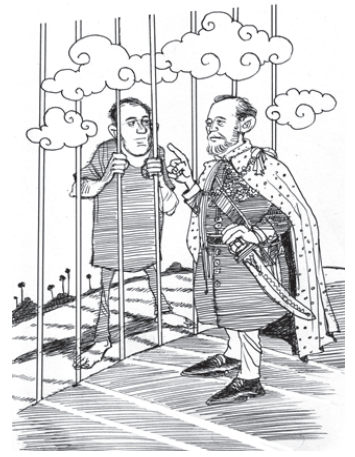
Incidentally, it is the only gaming house that is left untouched by the rulers in Europe and hence the gambling housekeeper pays so much money to the prince. There were many such gaming houses run by German sovereigns but some years ago they were forbidden to do so. The rulers stopped such gaming houses because they did a great deal of harm to the people. Many a time, it so happened that a man would come and try his luck, then he would risk all he had and lose it. He would finally drown or shoot himself. However, there was no one to stop the Prince of Monaco, and he remained with a monopoly of the business. So now, whoever wants to gamble goes to Monaco and the prince gains a lot of money this way. The Prince of Monaco knows that earning revenue this way is a dirty business but he feels helpless because he has to live.
Though the kinglet knows that collecting taxes on people’s ‘drinks’ and ‘tobacco’ is bad yet he is collecting taxes. In the same way, the Prince is living on the revenue he gets from the gaming house. He lives, reigns, rakes in the money, and holds his court with all the ceremony of a real king. He has his coronation and his levees. He rewards, sentences, and pardons. He also has his reviews, councils, laws, and courts of justice just like other kings, but only on a smaller scale.
In the next part of the story, we see the moral conflict faced by the Prince and his people. A murder was committed in the Prince of Monaco’s domains. The people of Monaco were peaceable and such a thing had not happened before. Like in other countries there was a legal system in place in Monaco also. The criminal was tried according to the procedures of law. The lawyers argued and the judges finally decreed that the criminal be executed as directed by the law. The prince read out the sentence, confirmed it, and ordered the execution of the criminal.
The story now takes a serious and interesting turn. There arose a problem in the execution of the king’s order. Monaco was a toy kingdom and it did not have either a guillotine for cutting heads off or an executioner, the man designated to carry out the execution. The ministers sent a letter of inquiry to the French Government, asking whether they could lend them a machine and an expert to cut off the criminal’s head and also inform the cost involved in it. They received a reply a week later informing them that the French Government would lend them a machine and an expert as well, and it would cost 16000 francs. The king felt that sixteen thousand francs was a lot of money and it was utterly a waste of money to spend so much on beheading a wretched criminal.
The king felt that the people would not accept his decision and if he forced them there might be a riot Therefore, the king called a council and asked them their suggestion. It was decided to send a similar inquiry to the King of Italy. They wrote to the king of Italy and they received a prompt reply. The Italian government informed them that they would supply both a machine and an expert at a cost of 12000 francs including travelling expenses. Though the price quoted by the king of Italy was cheaper than that of the French government, still the price was too much for a toy kingdom like theirs. Therefore, the ministers called another council and discussed the matter.
The council asked the General of the army to find a soldier who would be ready to cut off a man’s head. The members of the council believed that the soldiers have been trained for such a job. The general discussed the matter with his soldiers to see whether one of them would agree to do that job. But the soldiers did not agree to do it because they had not been taught how to behead a criminal.
The king and the ministers met again and discussed the matter thoroughly. Finally, they came to the conclusion that the best thing to do was to alter the death sentence to one of imprisonment for life. This way it would enable the prince to show his mercy and it would also be cheaper. The prince agreed to this and so the matter was arranged accordingly. Though there was no suitable prison for a man sentenced for life, they managed to find a place that would serve as a prison and put the criminal in it. They also placed a guard over him. The guard had to watch the criminal and had also to fetch his food from the palace kitchen. This way, they kept the prisoner imprisoned for more than a year. The whole arrangement of keeping a guard to watch over the criminal and feeding the criminal cost more than 600 francs a year.
One day, while the kinglet was examining the account of his income and expenditure, the new item of expenditure caught his eye. He got worried and so he summoned his ministers and urged them to find some cheaper way of dealing with the criminal. The ministers again met and discussed ways of reducing the expenditure. Finally, they all came to the conclusion that the guard could be dispensed with so that the expenditure on his salary could be saved. They went to the extent of saying “let the prisoner run away and be hanged”. The ministers conveyed their decision to the kinglet and the kinglet gave his consent to it.
Accordingly, the guard was dismissed; but they all waited to see how the prisoner would react. At dinner time the criminal came out, and not finding his guard, he went to the Prince’s kitchen to fetch his own dinner. After collecting his dinner, he returned to the prison, shut the door on himself, and stayed inside. He did not show any signs of running away and this got the ministers worried. The criminal was brought before the Minister of Justice. He suggested to the prisoner to run away. He even told him that if he ran away, the prince would not mind it The prisoner told the minister that he had nowhere to go and accused them of ruining his character by sentencing him to death.
Secondly, he told them that having been confined to the prison, he had given up his habit of working. He actually resented their action in not executing him. He finally told them that he would not like to agree to their proposal that he should run away and escape. The minister felt helpless.
Once more the council was summoned and the criminal’s issue was discussed again. They came to the conclusion that the only way they could get rid of him was by offering him a pension. The ministers decided to pay the prisoner a fixed sum of600 francs as a pension. On receiving the news, the prisoner told them that he would go away on that condition but they must undertake to pay it regularly.
Finally, the prisoner received one-third of his annuity in advance and left the king’s dominions. He emigrated to another country just across the frontier. He bought a bit of land, started market gardening, and lived there comfortably.
The narrator comments jovially that it is a good thing that the prisoner did not commit his crime in a country where they do not grudge expense to cut a man’s head off, or to keep him in prison for life. The author seems to question the very conviction of the rulers about the system of law and governance instituted by the rulers of big nations. The author seems to appreciate the courage and open-mindedness of Monaco in acknowledging their limitations and letting free the prisoner on humanitarian grounds. It is worth noting that the writer puns on the words ‘Too Dear!’. It means either ‘too expensive’ or ‘of great value’. The author leaves it to the reader to decide whether ‘Too Dear!’ refers to executing a criminal or saving a criminal’s life.
Too Dear! Summary in Kannada
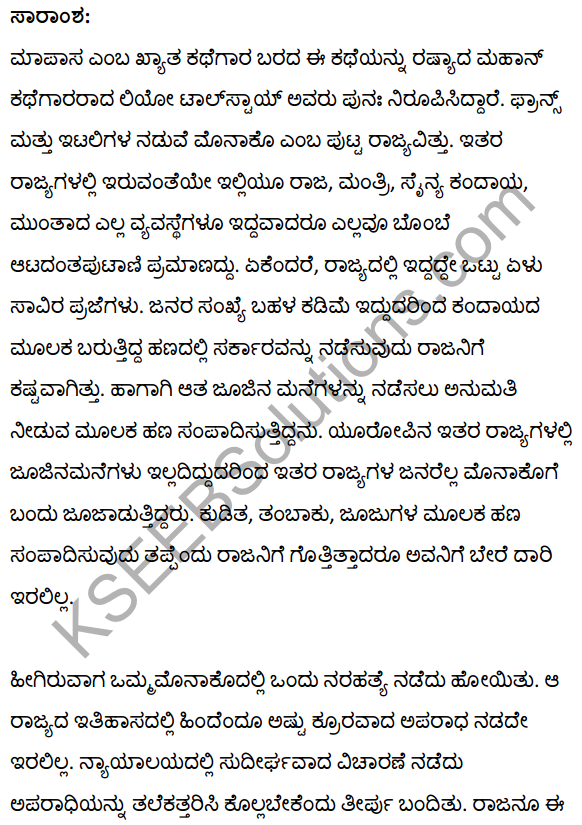
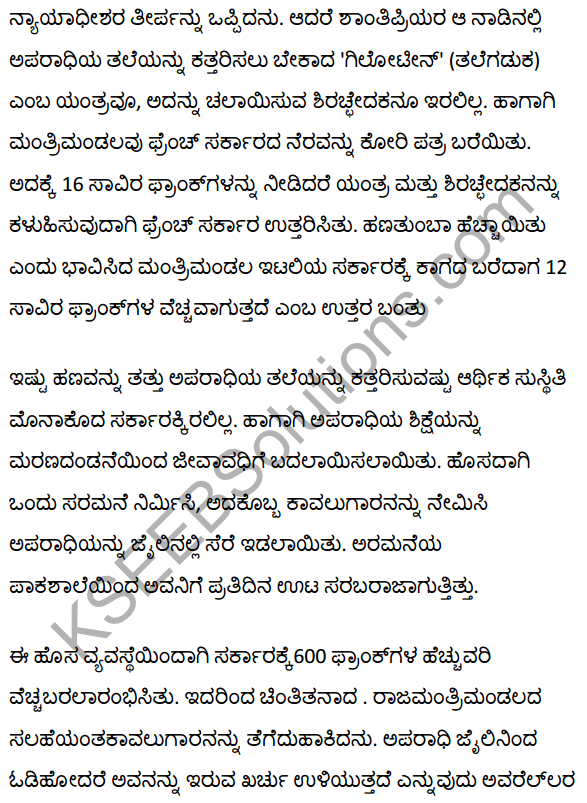
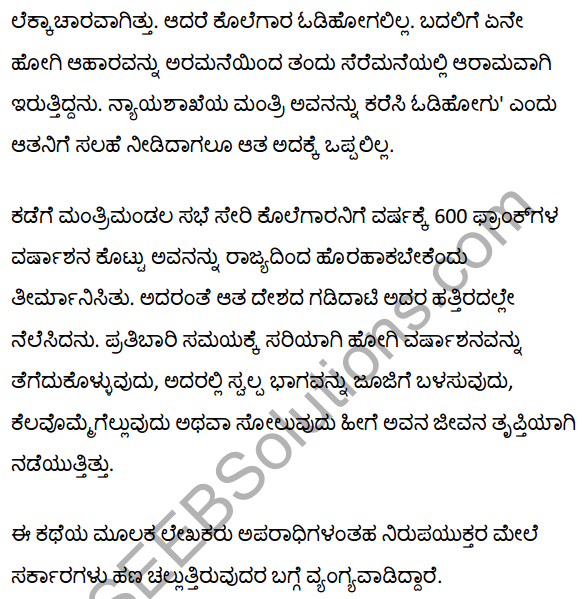
Glossary:
- Roulette: a gambling game
- rakes: (colloquial) especially of money: to earn
- levees: an official reception of guests or visitors in the morning
- poll tax: a kind of tax levied on an individual
- Franc: unit of currency of France
- kinglet: the king of a very small country
- domain: land ruled by a king
- peaceable: not causing violence
- spirits: strong alcoholic drinks
- gaming house: a place for gambling
- turnover (n): here, the total amount of money that passed hands between different gamblers
- hitch: a problem that causes a short delay
- jurymen: persons who give decisions in a court or help the judge make decisions
- barrister: lawyer (in higher law-courts)
- guillotine: a machine for beheading (criminals)
- dominions: territories (under the king)
- homely: simple and plain
- emigrate: go to another country to live there.
- stake: money used as a bet; money risked on gambling
- annuity: a fixed amount of money paid to somebody every year
- Frontier: the border between two countries
- grudge: do something unwillingly
The main aim is to share the knowledge and help the students of 2nd PUC to secure the best score in their final exams. Use the concepts of Karnataka 2nd PUC English Answers Chapter 2 Too Dear! in Real time to enhance your skills. If you have any doubts you can post your comments in the comment section, We will clarify your doubts as soon as possible without any delay.
